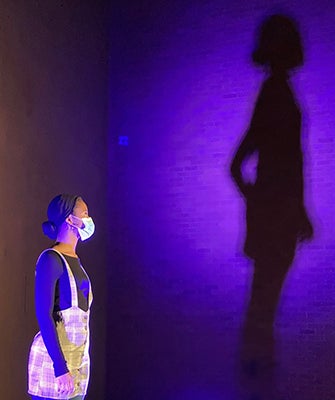ASU's Color Cabaret creates performance space for artists of color

Student cast of the ASU School of Music, Dance and Theatre’s Color Cabaret. Photo courtesy of Max Plata
Graduate music theater and opera student Yophi Adia Bost wanted to take ownership of the art she shared.
Bost said she got that chance as part of the School of Music, Dance and Theatre’s Color Cabaret.
“We are so often assigned roles to play that are written for people of color, and nine out of 10 of these roles feature us being oppressed or hide us as background characters,” she said.
For the past several years, ASU's Music Theatre and Opera program has organized small, student-led cabarets for the Tempe Center for the Arts' "Edge" series. One of the cabarets, known as the Color Cabaret, is centered on featuring the work of students, composers and authors of color, as well as creating roles for or re-imagined with artists of color.
“The Color Cabaret has become an anticipated tradition of hope, vulnerability and freedom within the program,” said student co-directors Jonice Bernard and Reem Soliman, both performance majors in music theater. “We have helped create a community of artists who courageously stand out and stand up for under-appreciated and discriminated groups – where we can all tell our stories, learn of our beautiful similarities and differences and create long-lasting change.”
Bost was excited to be a part of the Color Cabaret this year.
“It feels so liberating to be able to choose or not choose what those roles are for myself and take ownership of the art I choose to share,” Bost said. “As a music educator, I think few things have the ability to validate students’ cultures and provide students with confidence in their cultural identities quite like music.”
“This year, as a result of our diversity, equity and inclusion conversations, we elevated the production to include a live band and become an official, annual part of the ASU Music Theatre and Opera season,” said Brian DeMaris, associate professor and artistic director of ASU Music Theatre and Opera.
COVID-19 prevented a live event for 2021, but the cabaret was able to include over a dozen students with a live band and record performances for an online streamed event.

Student performer of the ASU School of Music, Dance and Theatre’s Color Cabaret.
“This year was quite challenging as we had to figure out not only how to direct a cabaret with a cast double the size of last year’s cabaret, but also how to make a high-quality, filmed version,” said Bernard. “We also wanted everyone to be able to sing without masks, so we had to choose a location for the cast to distance 6 to 12 feet apart.”
Every student who chose to perform was encouraged to bring music they felt was most authentic to themselves, regardless of genre or language, so the cabaret would be a place where the artists could perform without limitations, according to the co-directors.
“I wanted to be a part of the Color Cabaret because I have been craving to perform music from my country, Brazil, for a very long time,” said Bruno Streck Rodrigues, a master of music in performance student who graduated in May. “I wanted to not only uplift and spread the beautiful music we have in Brazil, but also to shed light on the atrocities that have been happening there due to the current government that is oppressing BIPOCThe acronym BIPOC stands for Black, Indigenous and people of color, but is also generally understood to include all other non-white ethnicities. Brazilians, women and LGBTQ+The acronym LGBTQ+ stands for lesbian, gay, bisexual, transgender and questioning and/or queer, with the plus symbol representing any and all other sexualities and gender identities, including but not limited to intersex, asexual and ally. Brazilians.”
The creative team for the Color Cabaret was formed through personal connections, friends and colleagues from all over ASU – a community of creators of color in all fields of music theater and opera.
“This was the first time I have ever worked with a creative team made up of only women of color, which was one of the most affirming and validating experiences in my graduate studies,” said Kiernan Steiner, music director and doctor of musical arts in choral conducting student, who graduated in May. “I wanted to be part of the Color Cabaret because I wanted to support the creativity and artistry of BIPOC and underrepresented students in the School of Music, Dance and Theatre.”
The Color Cabaret in February earlier this year and the Alumni Cabaret in October 2020 both helped raise over $5,000 toward scholarships for students of color. Both events were sponsored by the Music Theatre and Opera Student Organization, which is led by the Student Leadership Team. The BIPOC Student Scholarship fund is still accepting donations at ASU Students and Alumni for BIPOC Scholarships.
“My hope for the cabaret in the future is to always be a space safely held and reserved for any BIPOC students in the music theater program,” said Soliman. “So, wherever they take this show, as they push the envelope and break expectations, that will forever be the true spirit of the Color Cabaret.”
More Arts, humanities and education

ASU alumna makes her way back to the ASU Gammage stage for '¡azúcar!'
As the Los Angeles-based CONTRA-TIEMPO dance group prepares for its upcoming production “¡azúcar!” at ASU Gammage, for one member…

ASU FIDM professor wins international award for fantastical, sustainable creation
The horror of an ailing Earth inspired an Arizona State University fashion professor to create a fantastical garment out of…

ASU workshop trains educators, professionals from marginalized communities in disaster science
As devastating as hurricanes can be to anyone caught in their paths, they strike marginalized communities even harder.To address…